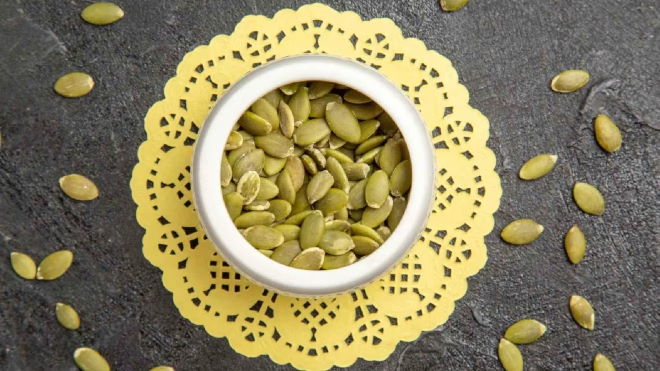
Raw Pumpkin Seeds vs. Roasted Pumpkin Seeds: Which is Healthy?
Pumpkin seeds are good for your immune system and heart. So should you eat pumpkin seeds or roast them? Learn the healthiest way to eat pumpkin seeds.
Pumpkin seeds, also known as pepitas, are a preferred snack for health-conscious people. They are small, often oval-shaped, green edible seeds found in pumpkins. These flat seeds are very nutritious and can be easily incorporated into a healthy diet. They provide essential vitamins, minerals, and fats that you need to stay healthy. But you may be wondering if it’s safe to eat raw pumpkin seeds. Roasting is another favorite way to enjoy these nutrients, which are good for your immune system and heart. So, should you eat raw pumpkin seeds or roasted pumpkin seeds?
What are the health benefits of pumpkin seeds?
1. Rich in antioxidants
Pumpkin seeds contain powerful antioxidants like beta carotene and vitamin E. The antioxidants found in pumpkin seeds can help reduce inflammation and protect cells from damage caused by free radicals.
2. Heart health
Pumpkin seeds are rich in magnesium, potassium, and healthy fats that help control blood pressure. According to the USDA, 100 grams of pumpkin seeds contain 592 milligrams of magnesium, 809 milligrams of potassium, and 49 grams of fat. They may help lower cholesterol and improve overall heart health.
3. Improve sleep
According to a 2023 study published in the International Journal of Nursing and Medical Research, pumpkin seeds are a good source of tryptophan, which boosts the production of serotonin which helps promotes sleep.
4. Improve immunity
According to the National Institutes of Health, Vitamin E found in pumpkin seeds helps strengthen immunity. Experts say, “Pumpkin seeds also contain zinc, an additional mineral that strengthens the immune system, helps wounds heal, and also prevents infection.”
5. Aid digestion
According to the USDA, 100 grams of pumpkin seeds contain 6 grams of fiber. The high fiber content in pumpkin seeds supports good digestion and may also help prevent or relieve constipation. But drink plenty of fluids, including water, to help the fibers work better.
6. May be good for diabetics
Pumpkin seeds may be beneficial for patients with type 2 diabetes, where the glycemic index is important. According to a study published in the journal Food Science and Nutrition Reviews in 2014, pumpkin seeds have hypoglycemic properties that may help control blood sugar in people with diabetes.
Should You Eat Raw Pumpkin Seeds or Roasted Pumpkin Seeds?
Both raw and roasted pumpkin seeds have health benefits, but how you eat them depends on your preferences.
Raw pumpkin seeds
Raw pumpkin seeds retain the highest levels of vitamins (including vitamin E), but their levels can decrease during roasting.
They contain no added oil, salt, or disinfectants, making them a clean choice.
Roasted Pumpkin Seeds
A 2021 study published in the Journal Nutrition Frontiers roasted pumpkin seeds at 120, 160, and 200 degrees Celsius for 10 minutes. Researchers found that as the temperature of roasted pumpkin seeds increased, all phenolic compounds, flavonoid content and antioxidant capacity increased.
- Roasting also reduces levels of phytic acid, an anti-nutrient that blocks mineral absorption.
- Roasting increases flavor and crunch, making it more delicious to eat.
- Roasting breaks down some ingredients that are difficult to digest, providing better nutrient absorption.
Does eating pumpkin seeds put you at risk for food poisoning?
Pumpkin seeds are generally safe to eat and generally do not pose a risk of food poisoning, experts say. However, sometimes eating raw foods, including pumpkin seeds, can cause food poisoning. A 2017 study published in the journal AIMS Microbiology states that pumpkin seeds can cause foodborne illness if they contain harmful bacteria such as salmonella and E. coli, causing symptoms such as vomiting, diarrhea and abdominal pain.
Stinky or stale pumpkin seeds can produce harmful bacteria or mycotoxins that can cause digestive problems or food poisoning. Also, raw pumpkin seeds have a negative effect on contamination during processing or transportation, so it is important to control this situation. that they are clean and fresh before eating
Before eating pumpkin seeds, place it in an airtight container in a cool, dry place and check for odor or mold.
Who should avoid pumpkin seeds?
- You are allergic to all seeds, including pumpkin seeds, because you may experience allergic reactions such as swelling and itching.
- You have digestive problems because the fiber content in pumpkin seeds can cause bloating, gastrointestinal problems, or digestive problems for people with sensitive gastrointestinal systems.
- You are on a calorie-restricted diet because pumpkin seeds are high in calories and should be consumed in moderation by people who are trying to lose weight or control their calories.
- You have high blood pressure because adding salt to pumpkin seeds can cause too much sodium, which can lead to high blood pressure.
You can eat pumpkin seeds straight from the shell or add them to salads or smoothies. Lightly toasting them with spices is also a good idea for a healthy snack, or use them as a topping for oatmeal, soup or baked goods. You can eat pumpkin seeds raw or roasted, but in moderation.

